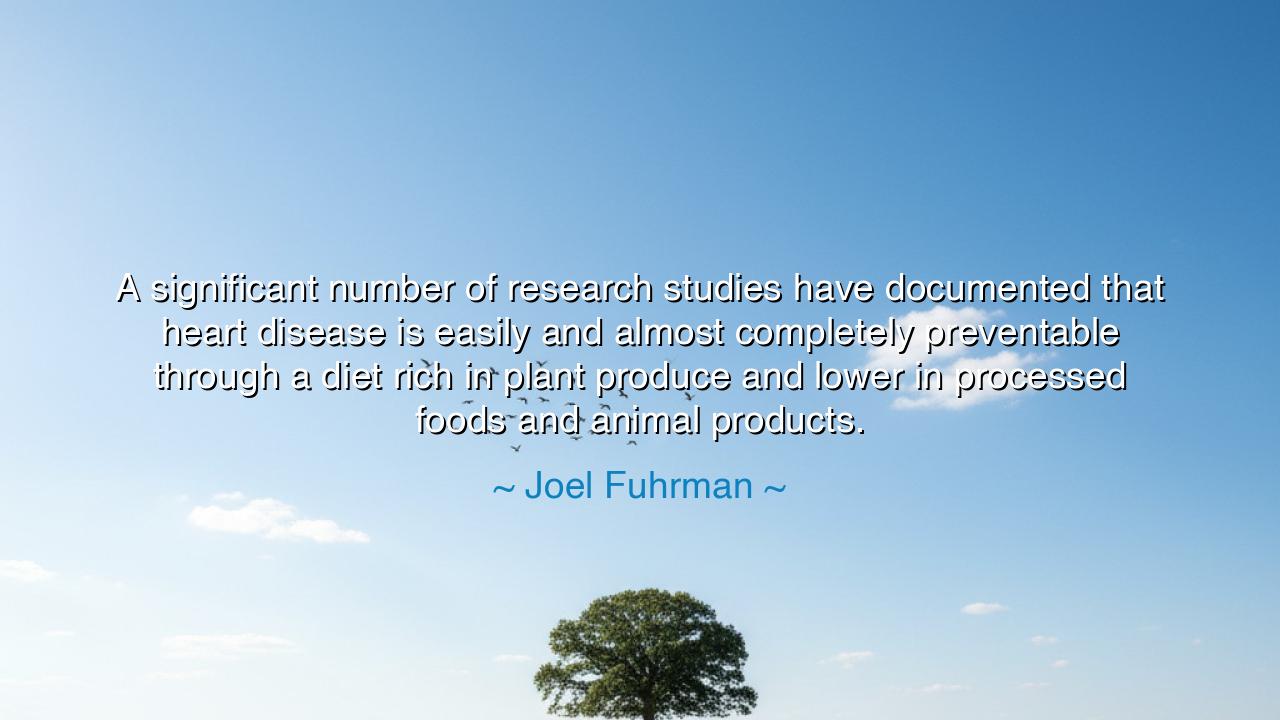
A significant number of research studies have documented that
A significant number of research studies have documented that heart disease is easily and almost completely preventable through a diet rich in plant produce and lower in processed foods and animal products.






In the resolute and compassionate words of Joel Fuhrman, the physician who has devoted his life to the healing power of nutrition, there is a truth both scientific and sacred: “A significant number of research studies have documented that heart disease is easily and almost completely preventable through a diet rich in plant produce and lower in processed foods and animal products.” Though spoken in the language of modern medicine, this statement echoes with the tone of ancient wisdom — the understanding that the human body, like the earth itself, thrives in harmony with nature’s abundance. Beneath its clinical precision lies a moral and spiritual revelation: that disease is not destiny, but the result of choices — and that health, vitality, and longevity are gifts within our grasp, should we learn again how to live as nature intended.
The origin of this teaching springs from Fuhrman’s long study of nutritional science and the ancient healing traditions that recognized the link between diet and wellbeing. His message is revolutionary only because we have forgotten what our ancestors once knew instinctively: that the foods of the earth — fruits, vegetables, grains, legumes, nuts, and seeds — are the medicine of life. His conclusion, drawn from modern research, is both simple and profound: that the human heart — the literal and symbolic center of life — need not fail if we nourish it with the living energy of plants. He speaks not of a miracle, but of a law written into the very fabric of creation: what we sow, we reap, even in the soil of our own bodies.
The ancients themselves lived by this principle. In the temples of Asclepius, the Greek god of healing, patients were treated not only with herbs and rest but with changes in diet and spirit. The physician Hippocrates, whom Fuhrman’s philosophy echoes, taught, “Let food be thy medicine, and medicine be thy food.” He knew, as Fuhrman reminds us today, that true healing is not found in the knife or the vial, but in the humble act of eating rightly. In contrast, when humanity turned away from the fields and the orchards, when it filled its tables with processed foods and its plates with excess flesh, disease followed like a shadow. The heart, burdened with fat and inflammation, began to fail — not from fate, but from forgetfulness.
Consider the story of Nathan Pritikin, one of the first modern pioneers to demonstrate what Fuhrman later affirmed through decades of research. Pritikin, diagnosed with advanced heart disease in his forties, refused to surrender to despair. He adopted a diet rooted in plant-based nourishment — fruits, grains, vegetables — and within months, his symptoms began to reverse. His energy returned; his arteries cleared; his life, once counted in years, stretched into decades. What medicine could not heal, nature restored. Such stories are not isolated miracles but living proof of a universal law — that the body, when aligned with nature, knows how to heal itself.
Fuhrman’s words also speak to something greater than the prevention of disease — they call us to a higher consciousness of living. To choose foods that give life is to make a moral and spiritual choice, to honor the temple of the body and the sacred earth that feeds it. When we eat the living things of the earth, we participate in the cycle of creation; when we fill ourselves with what is dead, we invite decay. Thus, a plant-rich diet becomes not merely a prescription for health, but a path to wisdom — a daily act of gratitude, humility, and reverence for the divine design of life.
Yet, there is tragedy in Fuhrman’s revelation, for he speaks in an age that has grown deaf to the quiet counsel of nature. The modern table groans with plenty, yet it starves the soul and sickens the heart. People perish not for lack of food, but for lack of nourishment. They eat to fill their hunger, but not their health. The irony is bitter: surrounded by abundance, humanity dies of its own excess. Fuhrman’s words, then, are both warning and hope — a reminder that salvation still lies close at hand, in the simple, beautiful act of returning to the food that grows from the soil, kissed by sun and rain.
So, my child of the future, take this teaching deeply into your heart: your health is your inheritance, and it is shaped not by fate, but by your faithfulness to the wisdom of nature. Eat the foods that give life — the fruits that shine with sunlight, the greens that carry the breath of the earth. Shun the lifeless and the artificial, for they dull the mind and burden the spirit. Let your meals be your medicine and your gratitude. And in doing so, you will not only strengthen your body but restore your harmony with the world.
For the wisdom of Joel Fuhrman — like that of the ancients before him — reminds us that the human being is not separate from nature, but a reflection of it. When we honor that connection, when we eat as the earth intended, we do more than prevent disease — we awaken to the fullness of life. And in that awakening, the heart — both physical and spiritual — beats again with strength, joy, and reverence for the sacred gift of being alive.






AAdministratorAdministrator
Welcome, honored guests. Please leave a comment, we will respond soon